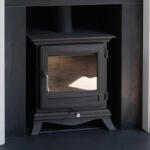
Introducing Peat Fire Logs
Are you looking for an efficient, clean and cost-effective solid fuel with a low environmental impact? If so, you may wish to consider experimenting with peat. Peat is one of the many fuels we sell here at London Gases and is a great alternative to logs and coal. But where does it come from and what makes it such an amazing fuel? If you’re not familiar with peat, it’s worth learning a little about it so that you can feel confident about investing in it. That’s why we’ve decided to use today’s blog entry to provide you with an in-depth introduction to this fascinating fuel.
Peat is a naturally-occurring fuel that is formed in bogs and marshes from partially-decayed plant- life. That may sound a little off-putting, but there’s no need to worry: peat isn’t just rotten vegetation and there’s nothing gross about it. The anaerobic and acidic conditions in peat bogs prevent plant matter from fully decaying while the accumulated weight of that matter simultaneously creates a high- pressure environment at the bottom of the bog. As a result, the usable, burnable components of the vegetable matter are compressed to form fuel while the components that can’t be burned are reduced by the natural process of decay. By the time peat has been dried and compressed into briquette form, it resembles any other solid fuel and will burn with an enticing natural aroma.
Finished peat briquettes contain very few impurities and pollutants, which means that they burn very efficiently and produce a high level of thermal energy. Their relative purity also means they are more environmentally friendly than some other fuel options and ensures that they produce almost no nasty smoke.
Peat bogs constantly generate new peat, which makes it a semi-renewable resource. At present, we humans are using peat slightly faster than our bogs can renew it, but the supply is always being slowly replenished.
Finally, it’s worth remembering that peat briquettes are cheap to produce, meaning that the fuel is cheap as well as environmentally friendly. So if you need a clean and cheap solid fuel option, why not try peat?
